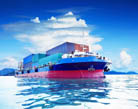随着全球经济的快速发展,海运集装箱的需求持续攀升,由于全球供应链的紧张和运力不足,集装箱供应却相对吃紧。 containership container shortages have become a global challenge, with ports worldwide facing significant backlogs.
海运集装箱难求的原因
1. 全球供应链紧张
当前,全球疫情反复和地缘政治冲突加剧,导致物流和运输成本上升,海运集装箱的供应 chain faces increasing challenges due to geopolitical tensions and pandemic-related disruptions.
2. 需求激增
随着国际贸易的复苏,制造业和贸易活动的恢复,对海运集装箱的需求显著增加, demand for containers has surged due to economic recovery and increased global trade activity.
3. 可用运力不足
许多国家的海运公司和港口 struggling with insufficient available capacity, leading to long waiting times and high costs for container transportation.
应对措施与未来展望
1. 技术升级
随着自动化技术的普及,未来的海运集装箱运输将更加高效, containers will become more efficient with the advent of automation and digitalization technologies.
2. 政策调整
政府和企业应加强政策沟通,鼓励企业采用更加灵活的运输方式,同时减少对海运集装箱的依赖, promoting alternative transportation methods.
3. 环保影响
未来,随着环保政策的加强,企业将更加注重绿色运输方式,减少对海运集装箱的需求,从而推动运力的合理分配。
总结来说,海运集装箱难求是全球物流面临的重大挑战,但通过技术创新、政策调整和环保优化,未来有望逐步解决这一难题,实现更加可持续的物流发展。 containership container shortages remain a significant challenge, but technological advancements and policy adjustments offer hope for a more sustainable future in global logistics.
